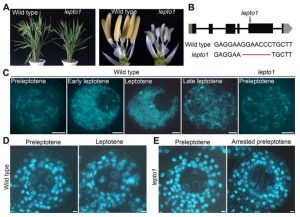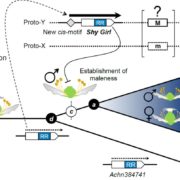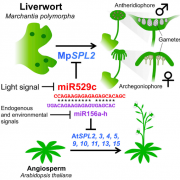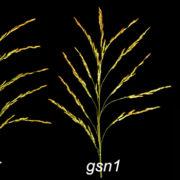OsRR24/LEPTO1 type-B response regulator is essential for rice meiosis (Plant Cell)
 In rice, successful completion of meiosis to generate haploid cells is essential for seed production and propagation. This process is complex, requires precise regulation, and produces visible changes in the structure of chromosomes. In this paper, Zhao et al., characterize a sterile rice mutant with defects in leptotene, an early stage of prophase I in meiosis, and used map-based cloning to identify an OsRR24/LEPTO1 type-B response regulator involved in the establishment of meiotic leptotene chromosome. The authors used chromosome staining techniques to visualize meiosis in lepto1 mutants and found that while meiosis initiates normally, the pollen mother cells (PMCs) fail to form the thin thread-like structures typical of leptotene chromosomes. Mutants also fail to form chromosomal double-strand breaks, do not recruit meiosis-specific proteins to the meiotic chromosomes, and show disrupted callose deposition. LEPTO1 is also shown to interact with two rice histidine phosphotransfer proteins, OsAHP1 and OsAHP2, via its conserved signal receiver domain . Collectively, this evidence suggests that LEPTO1 may act as a transcription factor to regulate the expression of genes to affect the development of meiocytes and nurse cells. (Summary by Katie Rogers) Plant Cell 10.1105/tpc.18.00479
In rice, successful completion of meiosis to generate haploid cells is essential for seed production and propagation. This process is complex, requires precise regulation, and produces visible changes in the structure of chromosomes. In this paper, Zhao et al., characterize a sterile rice mutant with defects in leptotene, an early stage of prophase I in meiosis, and used map-based cloning to identify an OsRR24/LEPTO1 type-B response regulator involved in the establishment of meiotic leptotene chromosome. The authors used chromosome staining techniques to visualize meiosis in lepto1 mutants and found that while meiosis initiates normally, the pollen mother cells (PMCs) fail to form the thin thread-like structures typical of leptotene chromosomes. Mutants also fail to form chromosomal double-strand breaks, do not recruit meiosis-specific proteins to the meiotic chromosomes, and show disrupted callose deposition. LEPTO1 is also shown to interact with two rice histidine phosphotransfer proteins, OsAHP1 and OsAHP2, via its conserved signal receiver domain . Collectively, this evidence suggests that LEPTO1 may act as a transcription factor to regulate the expression of genes to affect the development of meiocytes and nurse cells. (Summary by Katie Rogers) Plant Cell 10.1105/tpc.18.00479









